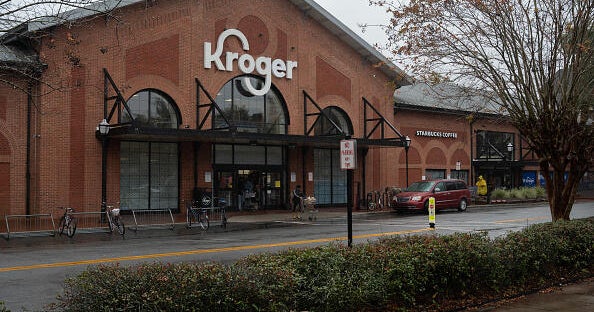A recent investigation has uncovered significant pricing discrepancies at Kroger supermarkets, raising concerns among consumers about being overcharged for items believed to be discounted. Conducted by Consumer Reports, The Guardian, and the Food & Environment Reporting Network (FERN), the probe reveals that expired discount labels on products have led to consistent overcharges across various locations in the United States. The allegations stemming from employees amidst labor negotiations have intensified scrutiny on Kroger’s pricing practices, as customers report a disturbing pattern of inflated costs on everyday grocery items.
| Article Subheadings |
|---|
| 1) Overview of Pricing Errors at Kroger |
| 2) Investigative Findings and Consumer Experiences |
| 3) Kroger’s Response to Allegations |
| 4) Broader Context of Overcharging Claims in Retail |
| 5) Impact of Staffing and Operations on Pricing Accuracy |
Overview of Pricing Errors at Kroger
The investigation into Kroger’s pricing practices began after several employees in Colorado raised concerning allegations amid ongoing labor negotiations. These workers highlighted systematic pricing errors at multiple Kroger stores, suggesting that customers were frequently paying more than expected due to expired sale tags on a wide range of products. The ramifications of this discovery are significant, as they call into question the integrity of pricing practices at a supermarket chain that operates roughly 2,700 stores across the United States. Among the affected brands are popular items like Cheerios and Nescafé, leading to consumer confusion and frustration.
Investigative Findings and Consumer Experiences
To validate these claims, Consumer Reports, alongside The Guardian and FERN, dispatched undercover shoppers to more than two dozen Kroger and Kroger-owned stores across 14 states and the District of Columbia. Over three months, investigators unearthed an alarming number of expired sales labels, which contributed to overcharges on 150 grocery items. On average, shoppers experienced an overcharge of approximately $1.70 per item—an increase of 18.4%. One notable incident involved a bag of Mission Flour Tortillas, mispriced at $4.99 when the sale price was supposed to be $2.99 at a Harris Teeter in Alexandria, Virginia. This finding highlights not only the extent of the problem but also the overall impact it has on consumer trust and satisfaction.
Kroger’s Response to Allegations
In light of these findings, Kroger has strongly defended its pricing practices. A spokesperson described the investigation as exaggerated and stated that the errors identified were merely isolated incidents amid billions of customer transactions carried out annually. They articulated that the ongoing accusations of widespread pricing inconsistency are “patently false.” Kroger emphasizes its dedication to accurate pricing and has cited measures taken to address any discrepancies. For instance, they assert that their employees are empowered to correct pricing issues on the spot to enhance customer satisfaction.
Broader Context of Overcharging Claims in Retail
Kroger’s issues with pricing accuracy are not an isolated case; the grocery retail industry as a whole faces similar accusations. Other major retailers, including Walmart and Safeway, have encountered similar allegations of overcharging due to mislabeling of prices. For instance, Albertsons recently agreed to a $4 million settlement to resolve a lawsuit accusing the chain of selling items at prices higher than advertised. This context underscores the ongoing challenges faced by retailers in maintaining pricing accuracy, particularly in regions where they represent a dominant option for consumers. In states where Kroger has a significant presence, complaints about expired prices have been mounting, suggesting that this is a persistent problem that predates the current investigation.
Impact of Staffing and Operations on Pricing Accuracy
A contributing factor to the pricing issues at Kroger is the reported decline in staffing levels across the company’s stores. According to data from the Occupational Safety and Health Administration, between 2019 and 2024, the average number of employees at Kroger-owned stores fell by 10.3%, which translates to a loss of 17 employees per location. Concurrently, the average number of hours worked by staff has also experienced a decline by 2.7 hours per week. This reduction in workforce may hinder the ability of employees to update price labels accurately. Kroger, however, has refuted claims of understaffing, insisting their staffing strategies are data-driven and aimed at sustaining efficient operations without compromising customer service.
| No. | Key Points |
|---|---|
| 1 | An investigation found widespread pricing errors at Kroger supermarkets, leading to customer overcharges on discounted items. |
| 2 | Expired sales labels were identified on over 150 items, with damages averaging $1.70 per item. |
| 3 | Kroger has denied allegations of widespread pricing inaccuracies, asserting these incidents are isolated. |
| 4 | The issue of pricing errors is not unique to Kroger; other retailers have faced similar claims. |
| 5 | Staffing reductions may be impacting Kroger’s ability to keep price labels accurate, although the company disputes this claim. |
Summary
The investigation into Kroger’s pricing practices reveals significant concerns regarding consumer overcharges due to expired sales labels, driving scrutiny on the chain’s pricing integrity amidst labor negotiations. While Kroger defends its practices, the plight of consumers and potential operational issues related to staffing levels point to a broader challenge within the grocery retail sector. As other retailers face similar allegations, the importance of accurate pricing and consumer trust becomes increasingly evident in today’s competitive market.
Frequently Asked Questions
Question: What prompted the investigation into Kroger’s pricing practices?
The investigation was initiated following allegations by Kroger employees in Colorado, who voiced concerns about systematic pricing errors amidst ongoing labor negotiations.
Question: What were the findings of the investigation related to consumer overcharges?
The investigation uncovered that over 150 grocery items were improperly priced due to expired sales labels, leading to an average overcharge of $1.70 per item.
Question: How has Kroger responded to the findings of the investigation?
Kroger has disputed the investigation’s findings, claiming that reported pricing discrepancies are isolated incidents and maintains that they are committed to accurate pricing.
